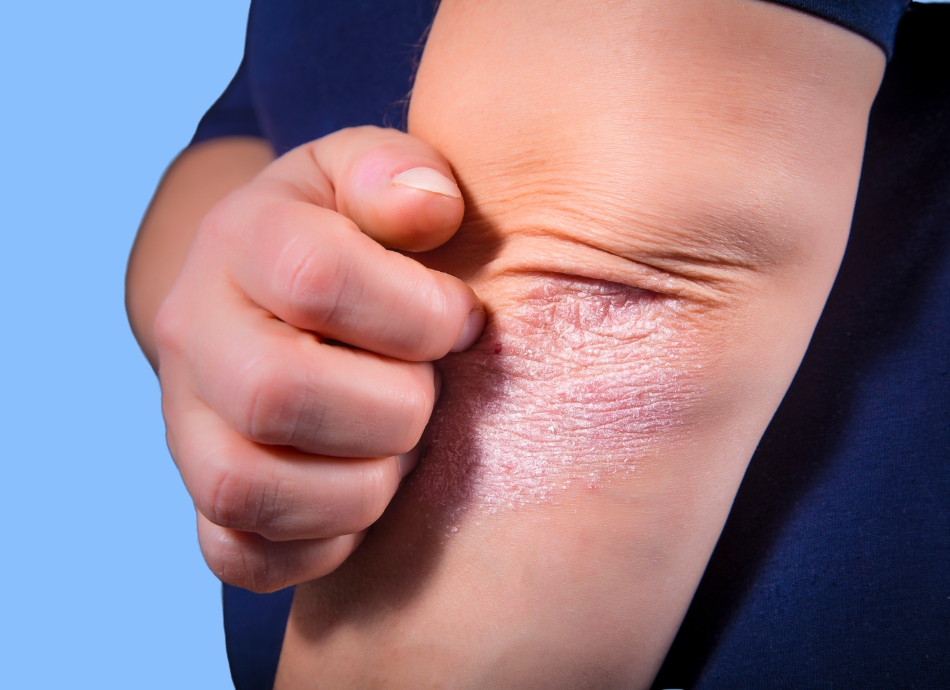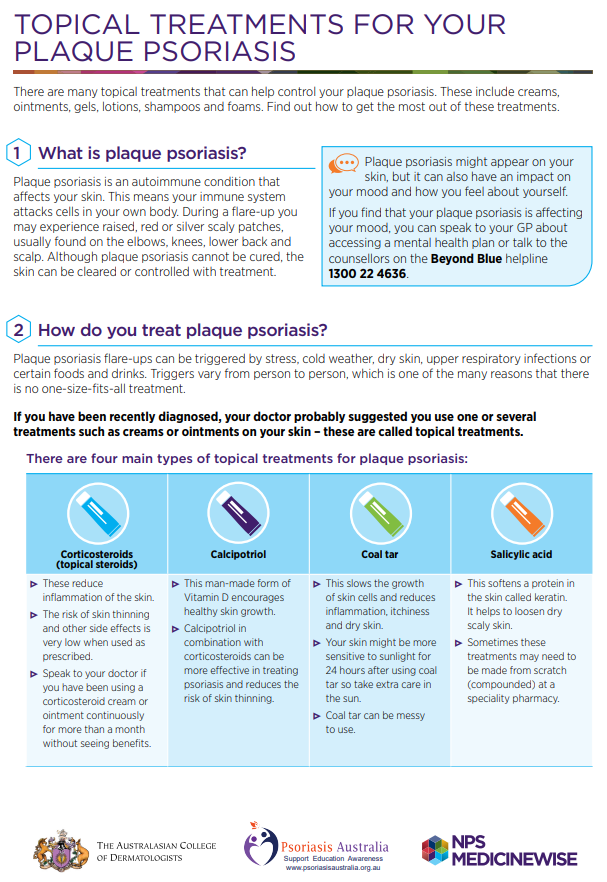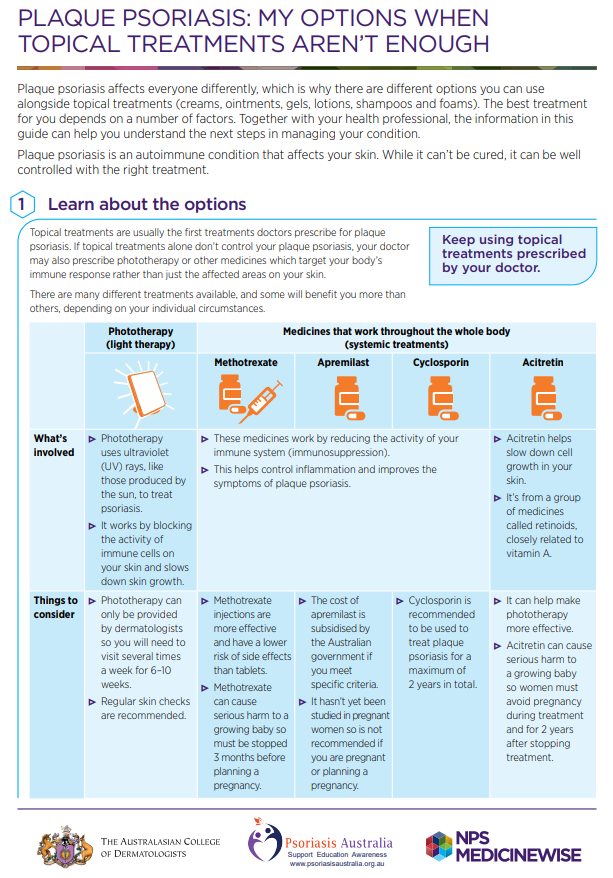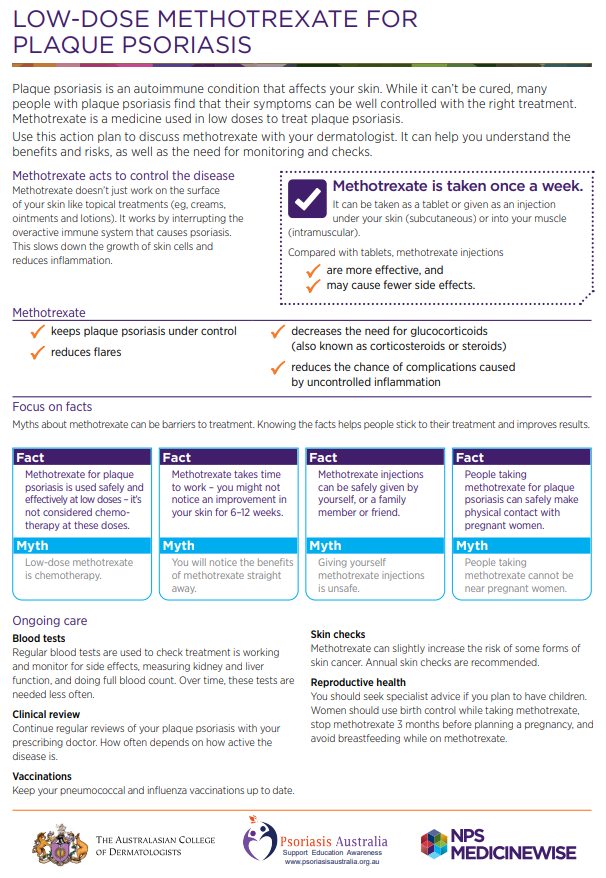You can now add Healthify as a preferred source on Google. Click here to see us when you search Google.
Psoriasis treatment
Key points about psoriasis treatment
- Treatment for psoriasis may not cure the condition but it helps to keep it under control.
- Treatment can help you avoid serious flares and also prevent your psoriasis from becoming worse.
- Find out about psoriasis treatments and how they work.

Psoriasis is a long-term (chronic) inflammatory skin condition. It cases red flaky patches of skin covered with silvery scales. It affects up to 2% of the population and can appear at any age.
Psoriasis can be improved, and sometimes cleared with regular treatment. Psoriasis can come back (relapse) if treatment is stopped. Read more about psoriasis.
Different types of treatment may be needed to keep your psoriasis stable or to control a flare-up. On this page, you can find information about the different treatments.
Emollients work by moisturising dry skin and reducing dry skin flakes. They soften cracked areas and help other topical treatments get through the skin and work better. Emollients can also be used instead of soap.
- It's usually advised to apply emollients about 30 minutes before other psoriasis treatments.
- Very mild psoriasis may settle with emollients alone.
- Emollients can be applied as often as needed until the skin is no longer dry.
- Emollients also soak into fabrics, so it's important that you change your clothing and bedding regularly.
- You can wear bandages or garments under your clothes to stop emollients soaking through.
- Read more about emollients and moisturisers.
Mild psoriasis is generally treated with ointments or creams that are applied to the affected area. The choice of treatment depends on where it is on your body and how severe the psoriasis is. They may include the following:
Steroid creams or ointments
Steroid creams or ointments (also called topical steroids) work by reducing skin inflammation, or redness and itch. They're available in different strengths – mild, moderate, potent (strong) and very potent (extra strong).
- Mild topical steroids can be helpful on your face or in skin folds (eg, under your arms).
- Very potent corticosteroids are usually used only on palms and soles as the skin is much thicker in those areas.
- If potent or very potent corticosteroids are used on the same area of skin for many months or years, there's a risk of skin thinning so ongoing prescriptions should be monitored by your prescriber.
- Read more about steroid creams and ointments.
Calcipotriol (Daivonex)
Calcipotriol is a vitamin-D like product. It reduces the thickness and scaliness of plaques. Calcipotriol is safe and popular as it doesn't stain your skin or have a strong smell.
Calcipotriol isn't usually prescribed during pregnancy and breastfeeding and can irritate sensitive skin areas such as the face and skin folds. It's important to protect yourself from the sun while you're are using it. Don't cover the area with a dressing or bandage.
Treatment is applied once or twice a day, and can be continued long term. Calcipotriol is available in combination with a steroid called Daivobet® and Enstilar®.
Read more about calcipotriol.
Salicylic acid
Salicylic acid can help reduce the thickness of the scaling but needs to be kept off the surrounding skin as it can be irritating. It's best used for short periods and over limited areas of skin and shouldn't be covered with a dressing or bandage.
Some salicylic acid products, especially higher strengths, can cause irritation if they're left on your skin for too long. Applying it to large skin areas may result in excessive absorption of salicylic acid by your body. Salicylic acid can also weaken hair strands, increasing the risk of breakage and potentially causing temporary hair loss. It will need to be prepared for you at a pharmacy.
Coal tar
Tar preparations reduce the thickness of the psoriasis. Tar preparations include bath oils, creams, ointment and shampoos. Coal tar has a distinctive smell that some people dislike and tar preparations can be messy and stain clothing. They can also make the bath and shower very slippery.
Tar can make your skin more sensitive to sunlight and it remains active on your skin for at least 24 hours after application. It's important to use sunscreen and limit the time your spend in the sun.
Pimecrolimus cream and tacrolimus ointment
These work by reducing skin inflammation and redness. They are safe to use almost anywhere, including the face and skin folds (flexures). They sometimes cause a feeling of burning or prickling after being applied but this often eases over a few days to weeks. Protect yourself from the sun when using them, and don’t cover the treated area with a dressing or bandage. Read more about pimecrolimus and tacrolimus.
Phototherapy is the controlled use of ultraviolet light to treat psoriasis. A course of treatment is usually for 8 to 10 weeks, 2 to 3 times a week. Two types of light are used:
- narrowband ultraviolet B light (nbUVB/TLO1)
- ultraviolet A light (PUVA).
PUVA requires a 'sensitiser', known as a psoralen that can be taken as a tablet or added to a bath before treatment.
Tablets or capsules
- Acitretin belongs to a group of medicines called retinoids. Retinoids are closely related to vitamin A and work by slowing down cell growth in your skin and reduces redness and swelling. Read more about acitretin.
- Methotrexate is used for severe psoriasis that can't be controlled with medicine applied to the skin or light treatments. Methotrexate works by suppressing the overactive immune system that causes psoriasis. It's a tablet and is only taken once a week. Read more about methotrexate.
- Ciclosporin is used for severe psoriasis that can't be controlled with medicine applied to the skin or light treatments. Ciclosporin works by suppressing the overactive immune system that causes psoriasis. Read more about ciclosporin.
Injections (biologics)
Biologics are usually used when other treatments haven't worked well. Biologics block reactions in your body that cause psoriasis and its symptoms, and they target the part of the immune system that's overactive because of psoriasis.
Biologics are only available as injections. Some injections may be able to be given at home, by yourself or by a family member. Your healthcare provider will show what to do and give you the information you need for your treatment.
Examples of biologics include:
- etanercept (Enbrel)
- adalimumab (Amgevita or Humira)
- infliximab (Remicade)
- secukinumab (Cosentyx).
If you take a biologic continuously, it tends to be more effective. Stopping and starting can cause a biologic to lose its effectiveness and may cause certain side effects.
Biologics can increase your risk of infection. If you develop any sign of an infection, such as a fever, cough, or flu-like symptoms, you should contact your healthcare provider immediately.
Resources
Topical treatments for your plaque psoriasis factsheet(external link) NPS MedicineWise, Australia
Plaque psoriasis – my options when topical treatments aren't enough – decision aid(external link) NPS MedicineWise, Australia,
Low-dose methotrexate for plaque psoriasis action plan(external link) NPS MedicineWise, Australia
References
- Psoriasis – an overview(external link) British Association of Dermatologists, UK, 2023
- Psoriasis(external link) DermNet, NZ, 2023
- Preparation for psoriasis(external link) NZ Formulary
- Psoriasis – diagnosis and treatment(external link) American Academy of Dermatology Association, US, updated 2023
Brochures

NPS MedicineWise, Australia, 2021

NPS MedicineWise, Australia, 2021

NPS MedicineWise, Australia, 2021
Credits: Sandra Ponen, Pharmacist, Healthify He Puna Waiora. Healthify is brought to you by Health Navigator Charitable Trust.
Last reviewed:
Page last updated:





